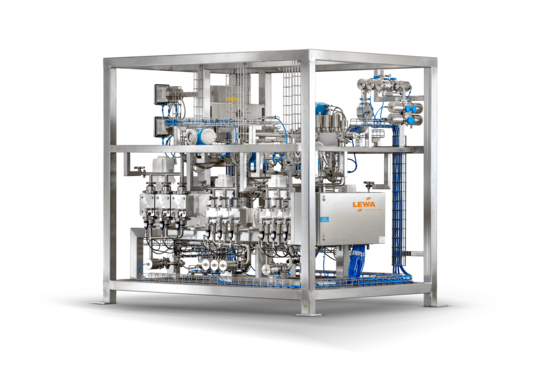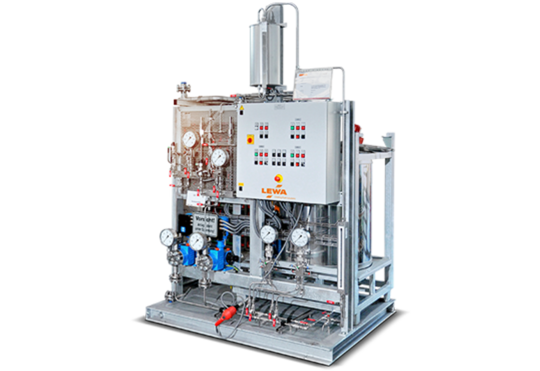Solutions
Metering systems for battery test facilities. Precise control, reproducible test results.
When traction batteries for electric vehicles are tested, extreme operating conditions are simulated. The test cycles vary in length from a few minutes to several hours. LEWA metering systems are used to dose a testing fluid in a closed loop to check the batteries at different temperatures in a wide temperature range.
These LEWA metering systems are divided into different layers: The first consists of a base frame, a drip pan and a cooling water connection. The second includes a tempering unit, metering pumps, measuring instruments and process connections. The third consists of a control cabinet, operating unit, controls and interfaces. By those, the metering systems can be easily connected to customer-side distributed control systems (DCS).
The ratio of the testing fluid is always unchanged, e.g. a water glycol mixture is used. The mixture is adjusted to the desired operating temperature by the tempering unit and then circulated in a closed loop through the batteries. With LEWA metering systems for battery test stands, fluids can be conveyed at temperatures of -30 to 85 °C, at flow rates of 30 to 900 l/h and at a maximum pressure of 10 bar. Metering systems for higher flow rates, temperatures or pressures are available on request.
The actual system components are furnished with thermal insulation. This is indispensable for the systems to prevent that ambient temperatures have an influence on the fluid temperature and its gradients. By this, reproducible results can be achieved. The process parameters volume flow and pressure are controlled symmetrically by the LEWA software in order to ensure reproducibility and stability. The software ensures that the maximum set pressure is never exceeded and does not damage the internal life of the batteries.

Background
Batteries in electric vehicles
In electric vehicles, so-called traction batteries are used. Lithium-ion batteries are the preferred type of traction batteries. In 2014, almost exclusively lithium-ion batteries were installed in electric vehicles.
The batteries are the central and at the same time the most expensive component of an electric vehicle and can add up to about 40% of the total costs. The traction batteries must be able to withstand a variety of charging cycles.
The so-called "memory effect", which is typical for many types of batteries, must not occur. The memory effect describes a loss of capacity of the batteries emerging over time and is characterized by an early voltage drop. As a minimum voltage is required, the battery runtime is sometimes significantly lower.
In the manufacturer's tests, the electric vehicle batteries are subjected to extreme operating conditions (such as high and low temperatures) in test cycles of varying duration. This simulates and examines the influences of the batteries’ aging process.
Industries
Bombas e sistemas de dosagem para outras indústrias
A LEWA oferece soluções e referências personalizadas para quase todas as indústrias em que os processos requerem uma dosagem exata ou o transporte confiável de fluidos. Como especialistas em tratamento de fluidos, também temos, naturalmente, experiência em áreas fora dos nossos mercados-chave.
More DetailsProducts
Sistemas específicos de dosagem, mistura ou enchimento específicos do cliente da LEWA
Sistemas de lote / contínuos e específicos para o cliente e para o seu processo de produção. Dosagem, mistura, enchimento, separação, controle de temperatura: Trabalhamos com você para desenvolver a seqüência ideal relacionada ao processo e produzir o sistema que se adapta ao seu processo de produção - até o produto final.
More DetailsSistemas de dosagem específicas para o cliente da LEWA
Sistema de dosagem "turnkey" em circuito fechado com equipamento de monitorização e teste de plausibilidade. Seu sistema de dosagem configurado individualmente com uma bomba idealmente projetada para a dosagem de fluidos em processos automatizados.
More Details


